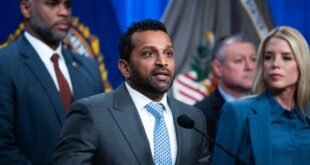This Sunday, 9 February, the stage is set for a historic clash at the Caesars Superdome in New Orleans, Louisiana, as the Kansas City Chiefs take on the Philadelphia Eagles for the coveted Super Bowl trophy. Yet, the excitement off the field has reached a fever pitch due to a recent, highly contentious decision by the NFL. In a move that has sparked intense debate, the league has opted to remove the “End Racism” banners—long seen as a powerful stand against racial hatred—from the end zones. Instead, the stadium will feature new slogans, “Choose Love” and “It Takes All of Us,” marking the first time in four years that the Super Bowl field will not display the anti-racism messages.
This decision comes at a time when the political landscape in the United States is as charged as ever. With former President Donald Trump scheduled to attend the game, the NFL’s move appears to be intertwined with broader national conversations about diversity, equity, and inclusion (DEI) initiatives. Trump, a vocal critic of DEI policies since his return to the White House for his second term, has long called for a return to what he describes as “merit-based” hiring practices across the nation.
In this article, we take a closer look at the factors behind this controversial decision, examine the political context in which it is unfolding, and analyze the responses from key figures within the NFL. We also explore the broader implications for the league’s messaging, its commitment to diversity, and the way sporting events can reflect—and even influence—the national dialogue.
The Changing Landscape of Super Bowl Messaging
For years, the Super Bowl has been much more than a championship game; it is a cultural phenomenon that captures the attention of millions across the globe. Traditionally, the NFL has used its platform to promote messages of social progress, unity, and inclusivity. One of the most visible symbols of these efforts has been the “End Racism” banners that adorned the end zones during the game. These banners served as a rallying cry against racial hatred and were a staple reminder of the league’s commitment to fostering a more inclusive society.
However, the decision to replace these banners with “Choose Love” and “It Takes All of Us” signals a notable shift. Sources close to the league suggest that this change is not merely cosmetic—it is a calculated response to the current political environment. A report by The Athletic hinted that the alteration of these powerful statements could be “a nod to the current political climate,” where divisive issues and public sentiment are shaping decision-making at the highest levels.
The Political Context: Trump’s Influence and DEI Debates
At the heart of the controversy is the political climate surrounding DEI initiatives in the United States. Since his return to the White House, Donald Trump has been an outspoken critic of diversity and inclusion efforts. His administration has emphasized the importance of merit-based systems and has pushed back against policies that, in his view, prioritize identity over individual achievement.
With Trump slated to attend the Super Bowl—a first for a sitting president—the NFL finds itself in a delicate position. The presence of such a polarizing figure has inevitably cast a shadow over the game, leading many to scrutinize every decision made by the league. The removal of the “End Racism” banners, in this context, is seen by some as a move designed to avoid igniting further controversy in an already charged atmosphere.
Yet, despite these changes, NFL Commissioner Roger Goodell has stood firmly by the league’s diversity initiatives. In a statement released earlier this week, Goodell reaffirmed the NFL’s commitment to promoting social progress. “We got into diversity efforts because we felt it was the right thing for the National Football League,” he stated confidently. “And we’re going to continue towards that, because we’ve not only convinced ourselves, but we’ve also proven that it makes the NFL better. I think it’s a reflection on our fan base, our communities, and our players.”
Goodell’s remarks suggest that while adjustments are being made to accommodate the prevailing political winds, the underlying values of the league remain intact. His statement underscores a belief that the NFL’s diversity initiatives contribute significantly to its identity and success, even as the league navigates the complex interplay of politics and sports.
The Rationale Behind the New End Zone Slogans
NFL spokesperson Brian McCarthy provided further insight into the decision-making process behind the change in the stadium’s messaging. According to McCarthy, the shift from “End Racism” to “Choose Love” and “It Takes All of Us” is, in part, a response to the string of recent tragedies that have shaken the United States. These include the devastating New Orleans truck attack, the catastrophic Los Angeles wildfires, and a fatal collision between an American Airlines flight and a military helicopter that occurred on 29 January.
“These are challenging times, and the country has endured collective grief and loss,” McCarthy explained to The Athletic. “We felt that the new messages are an appropriate tribute to what the country has gone through. They are meant to inspire and uplift, acknowledging the pain while also celebrating unity and resilience.”
This rationale is not without its critics, however. Some argue that changing long-established symbols like the “End Racism” banners may dilute the powerful message they carried, especially during a period when issues of racial injustice remain deeply relevant. Others contend that the new slogans, while positive, lack the direct call to action that “End Racism” embodied.
Trump’s Attendance and Enhanced Security Measures
Adding another layer of complexity to the situation is the confirmed attendance of former President Donald Trump at this weekend’s Super Bowl. As the first sitting president to attend the game, Trump’s presence has prompted the Secret Service to implement heightened security protocols. Anthony Guglielmi, a spokesperson for the Secret Service, commented on the situation: “Security measures have been further enhanced this year, given that this will be the first time a sitting president of the United States will attend the event.”
Trump’s presence is expected to draw significant media attention and could influence public perceptions of the game. His history of vocal opposition to DEI initiatives and his broader political stance add to the already polarized environment. For many fans and commentators, his attendance raises questions about the interplay between political figures and major sporting events, and whether the NFL’s adjustments in messaging are a direct reaction to his influence.
Diverging Perspectives: Voices from the NFL and Beyond
While some see the removal of the “End Racism” banners as a pragmatic response to a challenging political landscape, others view it as a potential step back in the league’s efforts to combat systemic racism. The divergent perspectives highlight the ongoing debate about the role of sports organizations in addressing social issues.
On one side of the debate, proponents of the NFL’s decision argue that adapting the stadium’s messaging is a way to pay homage to the nation’s collective resilience in the face of recent tragedies. They assert that the new slogans, “Choose Love” and “It Takes All of Us,” are inclusive messages that can unite fans regardless of their political or ideological leanings.
Conversely, critics warn that the removal of the “End Racism” banners may send the wrong message at a time when the fight against racial injustice is far from over. For these critics, the banners were more than just decor; they were a public declaration of the league’s stance on one of the most pressing issues of our time. Changing them, some fear, could be interpreted as a softening of that commitment.
In this context, NFL Commissioner Roger Goodell’s steadfast support for diversity initiatives is crucial. By reaffirming the league’s dedication to these efforts, Goodell attempts to bridge the gap between competing viewpoints and assure fans that the NFL’s core values remain unchanged—even if the outward symbols evolve.
The Broader Implications for the NFL and American Society
The controversy over the Super Bowl banners is more than just a debate about signage. It reflects a broader cultural and political struggle that is playing out across the nation. Sports, and especially the Super Bowl, have always been a microcosm of society. They mirror the triumphs, the challenges, and the evolving values of the communities they serve.
For the NFL, the decision to update the end zone messages at such a high-profile event is a reminder of the delicate balance that sports leagues must maintain. They are tasked with creating an environment that is welcoming and inclusive for all fans while also navigating the turbulent waters of political discourse. The current situation underscores the reality that even sporting events are not immune to the influence of national politics.
Moreover, the NFL’s handling of this issue could have long-term repercussions for its public image. In an era when social media amplifies every decision, the way the league communicates its values is under constant scrutiny. The new slogans aim to foster unity and collective healing, but they also risk alienating fans who view the “End Racism” banners as a symbol of progress and accountability.
The debate also raises important questions about the role of corporate and institutional messaging in times of national crisis. As the United States grapples with natural disasters, acts of violence, and political strife, symbols like these become rallying points for public sentiment. Whether the new messages will resonate as intended or provoke further controversy remains to be seen.
Final Thoughts
The removal of the “End Racism” banners from the Super Bowl field is a multifaceted decision that highlights the intersection of sports, politics, and social responsibility. While the new slogans “Choose Love” and “It Takes All of Us” are intended to offer a message of unity and collective healing, they have also sparked a heated debate about the NFL’s commitment to addressing systemic racism.


